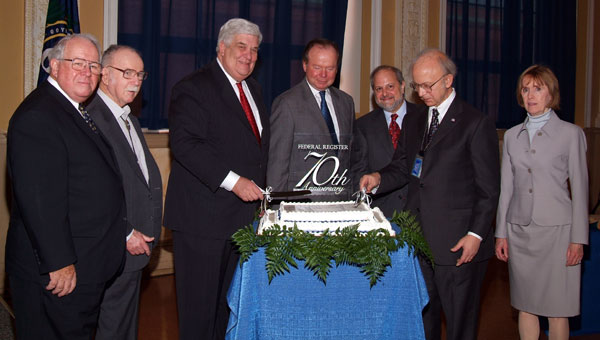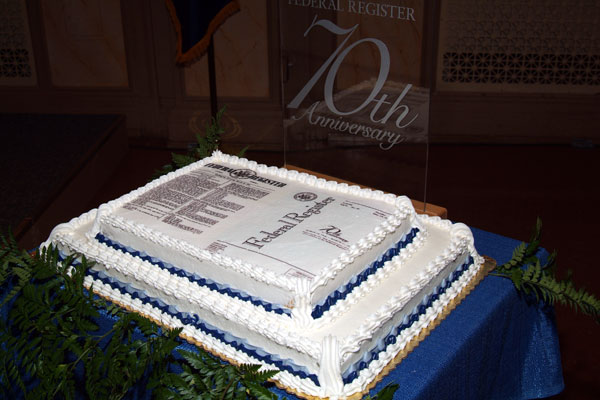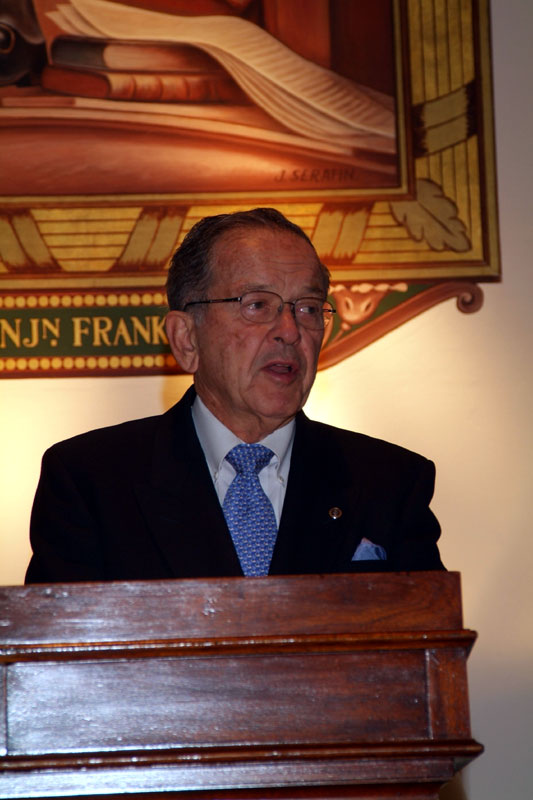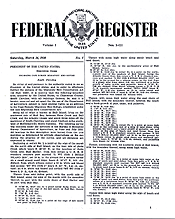
The Federal Register 70th Anniversary
On March 14, 2006, the National Archives and Records Administration (NARA) and the Government Printing Office (GPO) marked the 70th anniversary of the first issue of the Federal Register.
LISTEN to a report on the Federal Register’s 70th Anniversary that aired on Saturday, March 25, 2006, on National Public Radio’s “All Things Considered”.
Federal Register director Ray Mosley chats with Debbie Elliott. Listen Now
The Federal Register, the daily legal newspaper of the Federal Government, is published every business day and contains new and proposed regulations from Federal departments and agencies, Presidential Executive orders and proclamations, and other Presidential documents.
The celebration included officials from both NARA and GPO, representatives of institutions that rely on the publication, and several past directors of NARA's Office of the Federal Register.
The festivities, hosted by Archivist of the United States Allen Weinstein and Public Printer of the United States Bruce James, took place in Washington, DC, in GPO's headquarters near Capitol Hill, just across the street from the Federal Register's offices.
GPO is NARA's partner in publishing and distributing the Federal Register and other publications.
Public Printer James read a letter of greeting from President George W. Bush.
"Democracy hinges on an active and informed citizenry," the President wrote. "I appreciate the staff of the Government Printing Office and the Office of the Federal Register for devoting your time, energy, and talents to keeping our citizens informed."
The importance of the Federal Register to American democracy and the long, collegial relationship between GPO and NARA were two themes emphasized repeatedly during the morning's presentation.
In his remarks, Weinstein highlighted several things he finds remarkable about the Federal Register and its 70 years of publication.
"It's remarkable that the Office of the Federal Register produces a 250-page book every work day," he said. "It's remarkable also that two Federal agencies have worked together harmoniously for 70 years.
And for me," he added, "the most remarkable aspect of the Federal Register is how it upholds the democratic principles of the U.S. Government."
He explained that with the establishment of the Federal Register, the Government was required for the first time to keep citizens informed about its actions, and citizens were entitled to have their views considered.
Other speakers represented institutions and groups who rely on the Federal Register. The legislative branch of the U.S. Government was represented by Senator Ted Stevens, the Alaska Republican who is President pro tempore of the Senate.
"What began as a 16-page pamphlet has grown into a tremendous resource," Stevens declared. "As a member of Congress, I thank you for presenting this register to us every single working day."
Paul Clement, Solicitor General of the United States, noted that he was there as a representative of the executive branch, which supplies raw material for the Federal Register, and also as a user of the Federal Register, because his office often cites the publication in arguments before the Supreme Court.
"Thanks to the Federal Register," he said, "I have never argued a case based on a regulation that no longer exists."
Claire Germain, president of the American Association of Law Libraries, spoke of the importance of the Federal Register to law librarians.
"We like it because it brought order to a confused mass of regulations," she said. "We like that it comes out in a variety of formats."
She observed, "It's an essential tool for citizen access to law."
Among the special guests for the ceremony were the most recent five directors of the Office of the Federal Register:
- Fred Emery (1970-1979)
- John (Jeb) Byrne (1980-1988)
- Martha Girard (1989-1995)
- Richard Claypoole (1995-1996)
- Raymond Mosley, who has been director since 1996.
Read the Archivist's article:
"A Milestone for Democracy’s Daily Gazette"
Read the Prologue article,
"At the Federal Register, Tending to the Details of Democracy"



 An image of the first Federal Register on March 14, 1936. Learn more about the Federal Register
An image of the first Federal Register on March 14, 1936. Learn more about the Federal Register